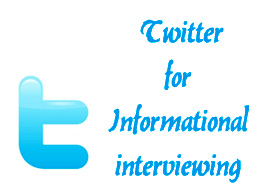
Informational interviewing is all about a job-seeker or a student getting information from an established professional in their field. In this back-flip of a regular interview, a novice is questioning a professional. Many times they’re set up through a mutual connection or a cold call, and they take place in an office setting.
Due to the prevalence of social media today, it’s completely possible to get the same information you could get from a face-to-face interview if you use Twitter for online learning
Finding a person to follow is as simple as finding the place you would like to work, visiting their website, and adding them on Twitter. Explain that you’re interested in their career field, and that you would like to hear what they have to say. Unless they’re a very private person (which is unlikely if they’re on Twitter), they’ll add you based on that information.
Now that you’ve made that first step, go ahead and follow other people who are doing your dream job. Find everyone from local bottom-rung workers to pros who have achieved near-celebrity status. Watch for tweets during the day, when they’re most likely thinking about work. Follow what they do all day and see how much time is spent in meetings or on the phone or working with a committee.
Another point to take away is how they talk about their job. Few will actually say they hate their work since it’s such a public forum, but they also won’t lie and say they love it. If the overwhelming majority of them talk about how much they love their job, it’s likely to be a satisfying position. If they all talk about how stressed out they are, rethink about how much you want the job.
You can also find out the personalities of people who hold the position. If they’re all very gregarious and you hate crowds and mingling, it might not be the best position for you. You don’t have to have a completely similar personality to the people you’re following, but it wouldn’t hurt to share some of the same values.
One of the most important pieces of an informational interview is networking. While it might seem like it’s missing at first in Twitter, you can find ways to incorporate it into your posts. If you’re going for a position in journalism, tweet about a local news event in hopes that your local contact will pick up on the fact that you’re involved in the latest news. By the same token, retweet links that he or she posts.
Once you feel like you’ve made a connection, take it to the next level. Ask to set up an interview in person with him, just to get some more information. In the interview, ask specific questions based on what he or she has been posting about and from all the knowledge you’ve gleaned from following the pros.
When you’re face to face, don’t talk about yourself unless you’re asked a question. You don’t have to be vague about your history, but don’t go into length on any particular detail. Think of it as a second informational interview, with all of the surface-level questions out of the way. Since you’ve already gleaned most of the information you need of Twitter, now is the time to impress them with the depths of your questions!
